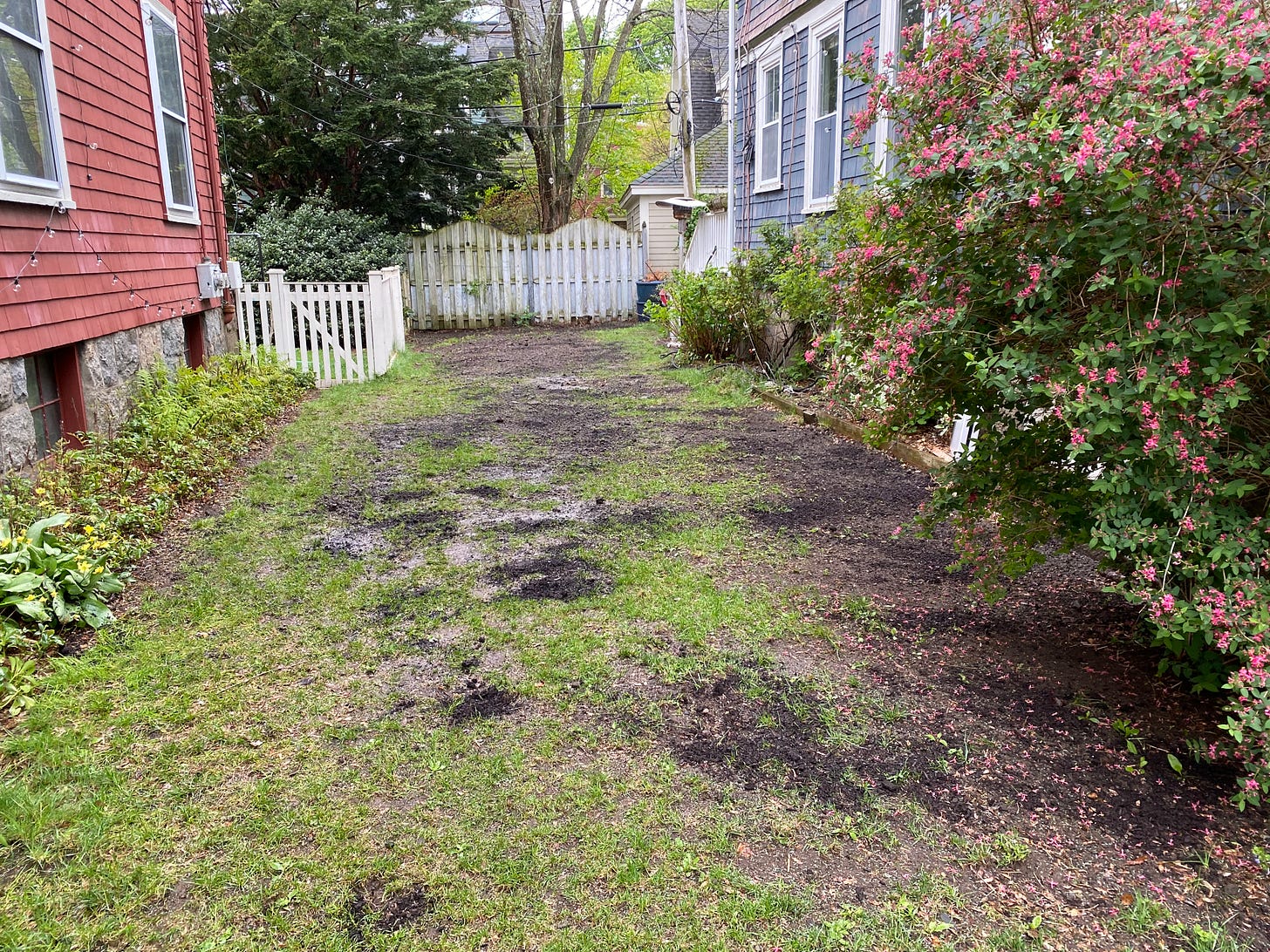21. Watch Your Attitude: If You Want to Change Your Writing, You Need to Change Your Mind
What We Talk About When We Talk About Love
A bad attitude is like a flat tire. You can’t go anywhere until you change it.
The above meme on disposition emphasizes how your attitude (or disposition or mindset) can hold you back. If your mindset is “fixed,” you’re less likely to change your assessment of the situation or see a reason to change your approach. In “Having a Growth Mindset Makes It Easier to Develop New Interests,” Paul A. O'Keefe, Carol Dweck, and Greg Walton explore how we become interested in things or sometimes limit our interests unnecessarily.
School and the Two Questions
When we are young, we often have a positive disposition towards subjects like science or writing, but our interest can tail off when the going gets tough. Later, we tend to think of various activities as things we are either good at or we’re not. Lynda Barry asks, “When did you first notice you were bad at something?” The first time often happens in a school setting as students who are labeled talented at certain things or lacking in other areas get tracked and have attention called to the quality of their performance. Barry says, “By fifth grade, most of us knew it was already too late.” Around this time, what she calls the “two questions”—Is it good? or Does it suck?—gain influence and become internalized.
Your good disposition sours. Grades and teacher comments reinforce this, and eventually, the two questions become Young-ha Kim’s “artistic devils,” causing you to draw premature conclusions about your potential. Barry lost the “floating feeling” she once had when drawing. She found that her attempts to make drawings that people would like led her away from the kinds of drawings that gave her such pleasure. This is the downside of audience. Yes, as Flower and Hayes say, good writers think about readers, but an is-it-good-or-does-it-suck audience is a tyrannical, pedagogy of severity-fueled bunch. These artistic devils can take possession of you. You become your own worst enemy, a stern judge, the last person willing to cut you some slack. About the good/suck binary, Barry asks, “Is one always in exchange for the other? Is there something missing in both?”
I suspect so.
If we are fortunate enough to find something we are passionate about, our disposition or mindset is crucial, according to O'Keefe, Dweck, and Walton:
Those with more of a fixed mindset were more likely to say that once you find your “passion,” it should come with boundless motivation, making its pursuit relatively easy. By contrast, people with more of a growth mindset were more likely to believe that pursuing that passion would involve some setbacks and difficulties.
As we saw in the last newsletter, the math student’s change in disposition brought math to life for him. Some pedagogy of charity-style teaching showed him new ways of approaching math problems and awakened his growth mindset or positive disposition. A “meh” school subject became something he now enjoys in his spare time.
In contrast, negative reactions to some of Barry’s drawings caused her to lose her “boundless motivation,” and she fell out of love with drawing. Some fixed-mindset thinking crept in. Because Barry’s early passion for drawing was crushed instead of nurtured at a crucial stage, this led her to compulsively compare herself to the “star” drawing students. In a desperate move, she tried making drawings that would please her critics. This approach turned something that had once been a pleasure into an anxiety-producing chore. What had been play was now work.
That Floating Feeling
How did Barry get her positive disposition back? By blocking the noise and simplifying. She went back to an aspect of drawing that had once been fun for her. For Barry, copying was fun.* It allowed her to stop focusing on what others might want or think, reminded her of the days when she drew just for the love of it, and helped her rediscover the pleasure of drawing.
I copied old illustrations and ads and then photographs. I copied poems and song lyrics, copied thoughts of others and tried to change my situation by copying my way into another world. And it worked.
This helped her develop her aesthetic. Now, she says, “I can copy anything into my own style.” Because of this time spent copying, which was just her version of Robert Lang’s playing with paper, Barry’s former “strange floating feeling of being there and not being there came back.” As she drew, “one line led to another.” She had rediscovered Csikszentmihalyi’s and Adams’s and Bakhtin’s concepts of “flow.” In other words, she fell back in love with drawing. When she stopped caring about the answers to the dreaded “two questions,” she was free.
No matter the cause of your negative attitude, it can doom you from the start. A poor disposition is at the root of other problems, such as procrastination, which is often mistaken for laziness. In “Defining Dispositions: Mapping Student Attitudes and Strategies in College Composition,” E. Shelley Reid recounts Luke’s story:
The art history class, he said, had been a boring general-education requirement, the assignment had seemed confusing and irrelevant, and so as the writer he had zero motivation, procrastinated too long, and thus wound up with insufficient time to complete the necessary research . . . . An epic fail—not because of his skills, but because of his attitudes.
I see this with my students, many of whom have achieved Olympic-level procrastination skills and developed advanced cases of writing anxiety. In “Beyond Knowledge and Skills: Writing Transfer and the Role of Student Dispositions,” Dany Lynn Driscoll and Jennifer Wells say your disposition can “allow or prevent successful development from taking place.” It’s not just about bad attitudes but also about related habitual thought patterns or unproductive metaphorical concepts that can tie your hands enough to keep you from excelling at things that are well within your skill set. Such thinking conspires to convince you that a particular topic doesn’t interest you and is not worth your attention. Lack of interest, in turn, reinforces the idea that you’re no good at this thing, which, in this artistic devil-driven, vicious circle, further convinces you that you’re not interested. In this chicken-and-egg scenario, though, we know which came first. It’s your bad disposition, which you probably learned in school.
Think of the 9-dot problem—it’s not that you can’t solve it; it’s that your mindset or disposition has narrowed your options unnecessarily. From this view, the puzzle looks stupid, pointless, and borderline impossible. Linda Flower and John R. Hayes address this kind of thinking in “The Cognition of Discovery: Defining a Rhetorical Problem.”
Our guess is that the poor writers we studied possess verbal and rhetorical skills which they fail to use because of their underdeveloped image of their rhetorical problem. Because they have narrowed a rhetorical act to a paper-writing problem, their representation of the problem doesn't call on abilities they may well have.
In other words, it’s a disposition issue. You can solve that dots puzzle. The tools are there. You’re just not using them. The math student had the skills but didn’t use them early on because of his “underdeveloped image” of his subject.
Assessment and Artistic Devils
It’s hard to have a good disposition about writing when your teachers are focused on fault-finding and assessment. School often leaves out one of the most important aspects of how to foster a growth mindset toward writing. Ta-Nehisi Coates puts it this way: “If you’re doing it correctly,” he says, the writing, at least initially, “will almost always come out really badly.” That’s a good thing, he says, but you have to train yourself to get comfortable with it and to free your mind from the artistic devil aspects of writing instruction. Once you do, things will look different to you. Something “really bad” can be kind of good.
So, does it suck? Well, the answer is almost always yes. It’s kind of supposed to suck. Good. If you accept that and decide to “revise over and over and over and over again,” as Coates urges, this will build Lang-like pathways, or as Coates says, you’ll “grow new muscles” that will make it possible for you to do things Coates says, that “I was not capable of doing before.” You’ll rewire that old disposition you latched onto back when you were left hanging in class or when that pedagogy-of-severity-type said that thing that made your inner artistic devils go ballistic.
After your disposition shifts to the growth side, then we’re entering rom-com territory—you know, when one character who couldn’t stand the other one at the beginning suddenly sees that person with new eyes and can hardly think of anything else.
After that, the former ambivalent math student can’t walk past a math book without getting that floating feeling.
If you change your disposition, all bets are off. What I’m talking about here is love. It’s the whole ballgame, the real subject of all our courses.
Notes
*In later newsletters, I’ll explain why I’m a fan of copying and why we should teach it. I’ll also discuss some of the virtues of plagiarism. (You heard me.)
Next in this series on writing and teaching, we will continue to address your bad attitude and work on ways to help you fall in love.
Red Wheel Barrow Update (or, When I’m Not Writing):
So much depends upon this red wheelbarrow, which has been in heavy use all week. There was some rainwater, too, but no white chickens. (I heard red-bellied woodpeckers and a red-winged blackbird, however.) This time of year in my neighborhood, your very own Mr. Writer-Type is known instead as Mr. McGregor because I am restoring the part of my yard we use as a common space for various gatherings. During COVID, we started using the space all year (with heat sources) so we could still socialize safely in the cold months. I wasn’t able to work on it last year. As a result, this year, the place was beaten to a pulp—compacted, nearly bare, and extra rocky.
My task is to restore it to its pre-COVID glory.
When we created the common area out of the former driveway more than 20 years ago, a neighbor child nicknamed the newly green space “The Meadow,” and the name stuck.
The work is complete, so The Meadow is closed until things grow in.
If I catch you in there, I’ll put you in a pie!





